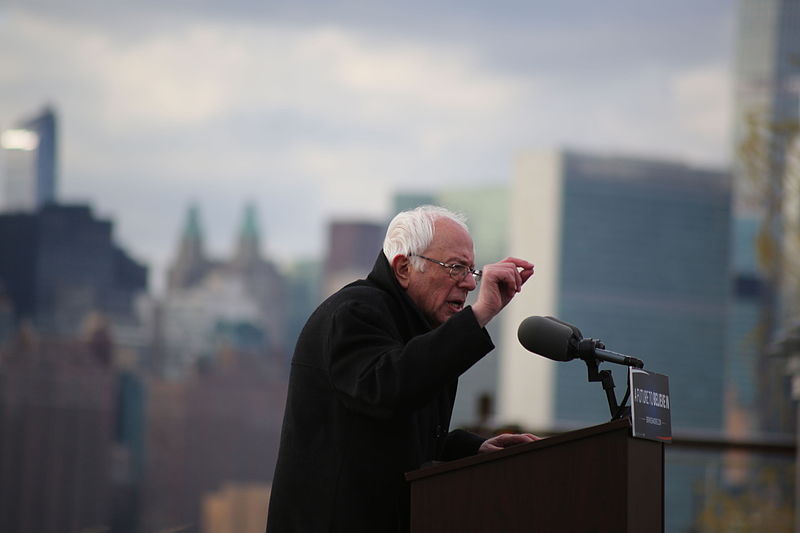Why Bernie Won’t Win, But His Positions (Eventually) Will
BY AIDAN COYNE 
The results of the Apr. 19 New York and Apr. 26 Pennsylvania primaries were not kind to Democratic candidate for president Bernie Sanders. Trailing Hillary Clinton by a sizeable amount of pledged delegates and polling well below her in the Empire State, he needed to outperform expectations in New York and make the contest a close race, at the very least, if he sought to remain a truly viable contender in the Democratic primary. Unfortunately for the Senator and his supporters, Clinton pulled off a sizable margin of victory, beating her challenger by a comfortable sixteen points. While the math, at first glance, didn’t (and doesn’t) look impossible for Sanders, a deeper dive into the data reveals more problems.
Sanders needed to follow up his New York disappointment with an unexpectedly strong showing in Pennsylvania to at least return to the prior state of the race. But the round of states that voted on the 26th brought Sanders little consolation, as he only won the small state of Rhode Island while losing several others to Clinton. The only significant contest left in the nomination race is now California, the largest state in the union. While this means that pledged delegates are still “out there”, Sanders would need to collect 66% of the outstanding pledged delegates to overtake Clinton. Given both the results of limited amount of polling in the state and the fact that the its demographics are favorable to Clinton, it would take an unprecedented and borderline miraculous comeback for Sanders to win California and capture the pledged delegate lead.
Then, the elephant in the room is Clinton’s domination of superdelegate votes relative to Sanders; this means even in the event that Sanders catches up to Clinton in pledged delegates, he will have to overturn the massive, ten-to-one ratio of super-delegates to secure the nomination. While it is reasonable that some super-delegates will switch over to Sanders if he moves the race into a statistical tie, it is not reasonable to assume that he will be able to secure more super-delegates than Clinton, based on both the current declarations of super-delegates and the fact that as a lifetime, prominent Democratic dynasty, the Clintons are more likely to have built up both influence and power over the party actors that make up the superdelegate base. While it is true that the super-delegates flipped in 2008, to put it bluntly, Bernie Sanders is no Barack Obama. Obama projected a youthful charisma and carried an inspiring message and brilliant oration, and while the cantankerous honesty of Sanders is likeable, he is not perceived as a strong candidate in the general election despite his strong head-to-head polling. It is worth noting that these promising head-to-head polls for Sanders precede any strong character attacks on him from conservative and business groups. And although Bernie’s frank, New Deal-esque liberalism is what makes him a strong draw for younger and more left-leaning Democrats and independents, he has made unfortunate statements in the past praising the Castro regime in Cuba and the Sandinista regime in Nicaragua, akin to what is called an “unforced error” in tennis terminology.
Furthermore, the Democratic National Committee, headed by Debbie Wasserman-Schultz, is not-so-subtly “in the tank” for Clinton, as evidenced by the growing list of voting problems in the primary season and the sporadic and poorly scheduled debate schedule. There is no reason to believe that the rest of the party bigwigs will prove to particularly kinder to Bernie if he somehow improbably enters the convention with a chance of securing the nomination. For what it’s worth, Sanders’ campaign is tacitly acknowledging its impending defeat by letting go many of his national campaign staffers.
But for those who support Sanders, this inevitable loss shouldn’t be taken too despairingly, at least in the long run. While Clinton promises to be four or eight more years of Obama-like policies if elected, and indeed has campaigned on as much, the reasons behind Sanders’s unpredictable surge are the reasons why the Democratic party will be nominating a candidate with his views sooner rather than later. At the risk of sounding morbid, the older voters who are currently propelling Clinton to victory will frankly be much less of an electoral force in eight or even four years. Moreover, the Democratic electorate is already shifting left in a swift reaction in line with our polarized times, with a full eight percent more Democrats identifying as “very liberal” in 2016 compared to 2008. Even if this trend continues at a slower pace, at say a four percent increase of “very liberal” identifiers in 2024, that small rise could make all the difference in a tight race. And, as the media loves to point out, the so-called Millennial Generation is the most liberal on record, and even if it is assumed that some people become more conservative with age, they will still likely be more liberal than the generations that came before them. On issue after issue, more and more Americans are embracing positions previously perceived as too left-wing for Americans, such as nationalized healthcare, reducing overly onerous prison sentencing and the nation’s industrial prison complex, prioritizing collegiate education, and the list goes on. Support for these views will not stop growing, and might even grow further if the structural issue in the country continue to go unaddressed, and likewise the voting coalition that have backed Bernie will not simply go away.
Sanders was not well-known before his presidential run, and his success, more than Obama and more than Clinton, is based solely on his policy positions rather than his personal characteristics. And support for these positions took Sanders to a near tie with the former Secretary, former First Lady, lifelong Democratic royalty, and potential first ever woman President of the United States. That alone states the case for why liberals like Sanders will soon come to rule the roost in the Democratic party.